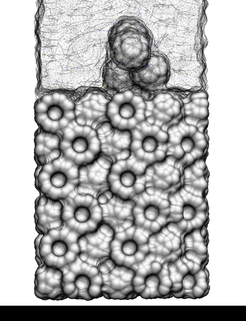15 million euros allocated to the research on printed electronics
This year, the Max Planck Institute for Polymer Research in Mainz, Germany is taking part in another two ambitious research projects: InterPhase and POESIE. Both projects are funded by the German Federal Ministry of Education and Research with a total of 15 million euros.
Mainz. This year, the Max Planck Institute for Polymer Research (MPI-P) in Mainz, Germany is taking part in another two ambitious research projects: InterPhase and POESIE. Both projects are funded by the German Federal Ministry of Education and Research with a total of 15 million euros. These two highly interdisciplinary projects involve altogether 14 scientific teams, among them the Theory Department of the MPI-P directed by Prof. Kurt Kremer. Scientists hope to clarify fundamental properties of organic semiconductors and to optimize materials and processes for the production of printed electronic components.

€ 8 million euros have been awarded to the project InterPhase (Design principles in organic electronics: heterogeneities in the bulk and at phase boundaries and interfaces) over the next three years. Dr. Denis Andrienko, a project leader at the MPI-P, is the principal investigator leading the theoretical work package in InterPhase. The project deals with the development of characterization techniques for organic materials, in particular organic/organic and organic/inorganic interfaces. The theoretical work package will mainly focus on injection and transport properties of charge carriers, efficiency of electrostatic doping, and chemical immobilization of guest molecules in hosts.
POESIE (The potential of printed organic electronics: optimized materials, fluids and liquid phase processes) will also be funded over the next three years with € 7million euros. POESIE aims to understand and optimize materials and protocols used for processing of organic semiconductors from liquid phase, for instance ink-jet printing. Dr. Kostas Daoulas, a project leader at the MPI-P, will be coordinating the simulation/theoretical work package in this project. He will explore molecular-level mechanisms controlling rheological behavior and morphology of functional inks during various stages of printing.
Photonics and organic-based optoelectronics have been recognized by the European commission as a key enabling technologies. This sector features a broad palette of interrelated photonics technologies such as LED (Light Emitting Diodes), OLED (Organic Light Emitting Diodes), OPV (Organic Photovoltaic), Flexible Electronics based on OLAE (Organic Large Area Electronics) and Display technology. These technologies are expected to play a fundamental role in solving the grand challenges of human society in the next decades not only lowering power consumption and CO2 emissions but also improving medical and health care.












